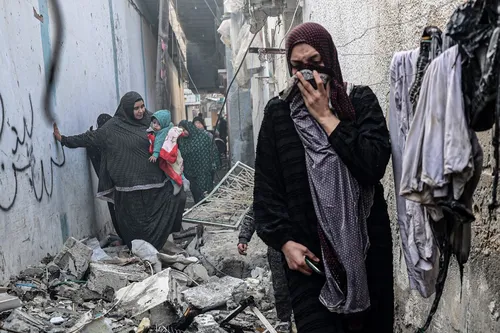
A day after Israeli Prime Minister Benjamin Netanyahu said the killing of seven aid workers in Gaza was a mistake, an investigation by Al-Jazeera showed that the attack was intentional.
Citing eyewitness testimonies, open source data and images from the attack site, the Sanad Verification Agency of Al-Jazeera makes it clear that Israeli forces launched three airstrikes, targeting three different vehicles in three different locations — which cannot be attributed to an error.
Other assessments also confirm that there was a considerable gap of more than 30 minutes and a distance of just over three kilometers between the three vehicles when they were attacked, which rules out the possibility of accidental bombing.
A World Central Kitchen (WCK), the agency to which the aid workers belonged, has already stated that the vehicles hit by Israeli airstrikes were clearly identifiable, with bold WCK markings on their roofs, and that their movements were coordinated in advance with the Israeli government.
Except for a Palestinian from Rafah, the other six aid workers killed in the Israeli attack were from different countries: three from the United Kingdom, one from Canada, one from Australia and one from Poland. WCK demanded a fair and independent investigation into the murders and called on the countries of which the massacred aid workers were citizens, Australia, the UK, the US, Canada and Poland, to join them in demanding an investigation.
The governments of the United Kingdom, Canada and Australia have close diplomatic relations with Israel and have mostly supported the Israeli war in Gaza, labeling acts of genocide as Israelis’ “right to self-defense.”
Israel has never provided plausible explanations for its previous attacks on aid workers, such as the massacre of International Rescue Committee workers in March.
Israel halts humanitarian aid work in Gaza
Following the attack, the WCK announced that it is suspending its operations in Gaza. Several other humanitarian organizations also made the same decision, realizing that providing humanitarian aid services would put the lives of their workers at risk. The UN also announced the suspension of its aid delivery activities overnight, for at least 48 hours, on Wednesday (3).
Stephane Dujarric, spokesman for United Nations Secretary-General António Guterres, says the suspension of aid has a “double impact” on Palestinians seeking aid, as well as a “psychological and chilling effect” on remaining aid workers, who they continue to do their utmost to deliver help to people who need it, even at great risk.
WCK was assisting the World Health Organization (WHO) in providing food to healthcare workers and patients in different hospitals in Gaza. Health professionals themselves are working in exceptionally difficult conditions. Most hospitals in Gaza, including the largest, Al-Shifa, have been closed due to continued attacks by Israeli forces. The few hospitals still operating have limited resources and are overcrowded with patients and people seeking shelter from Israeli bombings.
Attacks on WCK workers are not rare or exceptional. The Zionist state has repeatedly attacked aid workers, killing more than 200 of them since October 7, according to the UN. Israel deliberately reduced the flow of aid, forcing some countries to resort to dropping supplies by air, which also resulted in deaths.
In recent months, Israeli forces have targeted and killed hundreds of Palestinians awaiting aid deliveries. In most of these cases, Israeli forces blamed Palestinians for street congestion.
Israel has also carried out targeted attacks on the United Nations Relief and Works Agency for Palestine Refugees in the Middle East (UNRWA), which is the largest and most effective aid agency in Gaza. UNRWA is responsible for assisting more than a million Palestinians displaced during the war. These attacks were based on unfounded allegations of collaboration with the Hamas group. As a result, several countries, including the US and the UK, suspended their funding to the UN agency, citing these statements.
All of this comes amid reports from multiple United Nations agencies of increasing hunger among hundreds of thousands of Palestinians in Gaza. Furthermore, the risk of hunger continues to grow. Israel managed to violate both the International Court of Justice (ICJ) interim order and the UN Security Council resolution on providing greater access to humanitarian aid for the Palestinians.
How did the Euro-Med Human Rights Monitor in a recent report: “The use of hunger as a weapon was an official political decision from the first day of the war, as declared by the Israeli Defense Minister, and implemented in integrated stages, which included tightening the siege and closing border crossings ; preventing the entry of commercial goods; destruction of all components of local production and food sources; the increased dependence of the population of the Gaza Strip on humanitarian aid; and transforming it into their main source of food.”
Source: www.brasildefato.com.br

